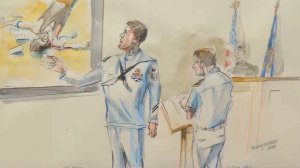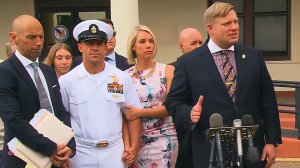A witness called to testify against a fellow Navy SEAL charged with murder has admitted that he killed the victim — a wounded Islamic State fighter — in an act of mercy, a bombshell that didn’t deter the military from its case.
Corey Scott, a medic, told a military jury Thursday that he asphyxiated the adolescent Iraq war prisoner after Special Operations Chief Edward Gallagher unexpectedly stabbed the boy in 2017.

A visibly angry prosecutor accused Scott of lying, saying he had told investigators a different story several times and changed it only after he was granted immunity and ordered to testify.
It’s a big boost for Gallagher, who is fighting charges of premeditated murder in the boy’s death and attempted murder in the shooting of civilians.
The Navy said in a statement it will not drop the murder charge and it’s up to jurors to decide the credibility of witnesses.
Scott said that before the stabbing, he and Gallagher had stabilized the sedated prisoner who was wounded in an airstrike and that he was breathing normally through a tube inserted to clear his airway.
Scott said he was shocked when Gallagher, the platoon’s leader, stabbed the boy at least once below the collarbone. He said there was no medical reason for it. Gallagher then grabbed his medical bag and walked away.
“I was startled and froze up for a little bit,” Scott said.
Scott said the boy would have survived the stabbing, but he plugged the youth’s breathing tube with his thumb because he believed the prisoner would eventually be tortured by the Iraqi forces who captured him and delivered him to the SEAL compound for medical treatment.
“I knew he was going to die anyway, and I wanted to save him from waking up to whatever would happen to him,” Scott said.
Scott was the fourth SEAL to take the stand and second to say he witnessed the stabbing. Prosecutors have alleged that the stabbing killed the boy.
The prosecutor, Lt. Brian John, said Scott changed his story only after being granted immunity that prevents him from being charged in the killing.
“So you can stand up there and you can lie about how you killed the ISIS prisoner so Chief Gallagher does not have to go to jail,” John said. “You don’t want Chief Gallagher to go to jail, do you?”
“He’s got a wife and family,” Scott said. “I don’t think he should be spending his life in prison.”

Scott met repeatedly with investigators and never revealed he had anything to do with the death, John said. He had asserted there was no way to save the prisoner’s life.
Scott said no one asked him how the patient died and acknowledged the immunity deal allowed him to finally fess up.
He wanted to invoke his Fifth Amendment right against self-incrimination when called by the prosecution, but the judge rejected that. Capt. Aaron Rugh granted him immunity and ordered him to take the stand.
Retired Army Maj. Gen. John Altenburg Jr., who handled or oversaw about 1,000 military trials, says such a dramatic change in testimony is rare but is a risk of granting immunity to a witness.
“You’re assuming a certain amount of risk that you know what they’re going to say and that what they’re going to say is truthful,” Altenburg said. “If you get surprised, you get surprised. That’s what can happen when you have cases like this.”
The testimony follows another serviceman who described the stabbing and a former SEAL who said Gallagher later scoffed that the victim was “just an ISIS dirtbag.”
The former SEAL, Dylan Dille, also described several instances when he said Gallagher had fired at civilians, once shooting an old man.
Scott said he did not recall previously telling investigators that Gallagher had shot women and children.
The defense has said Gallagher only treated the prisoner for a collapsed lung and that disgruntled sailors fabricated the murder accusations because he was a demanding leader and they didn’t want him promoted.
Defense attorney Tim Parlatore said Scott’s testimony proved one thing in the case against Gallagher: “It means he’s not guilty.”
Gallagher’s wife said she was relieved.
“To hear today that someone’s finally had the bravery to stand up for the truth was refreshing after all these years,” Andrea Gallagher said as she stood with her husband and their two children outside court.
Gallagher’s case has drawn the attention of President Donald Trump, who ordered him moved from the brig to Navy hospital earlier this year and is reportedly considering a pardon.
The Navy said the jury can convict Gallagher of a lesser charge, such as premeditated attempted murder, which carries a maximum penalty of life with parole. There is no minimum sentence.
The seven-man jury is made up of five Marines and two sailors — all veterans of war zones. A two-thirds majority — at least five — is needed to convict. Anything less ends in acquittal.





















